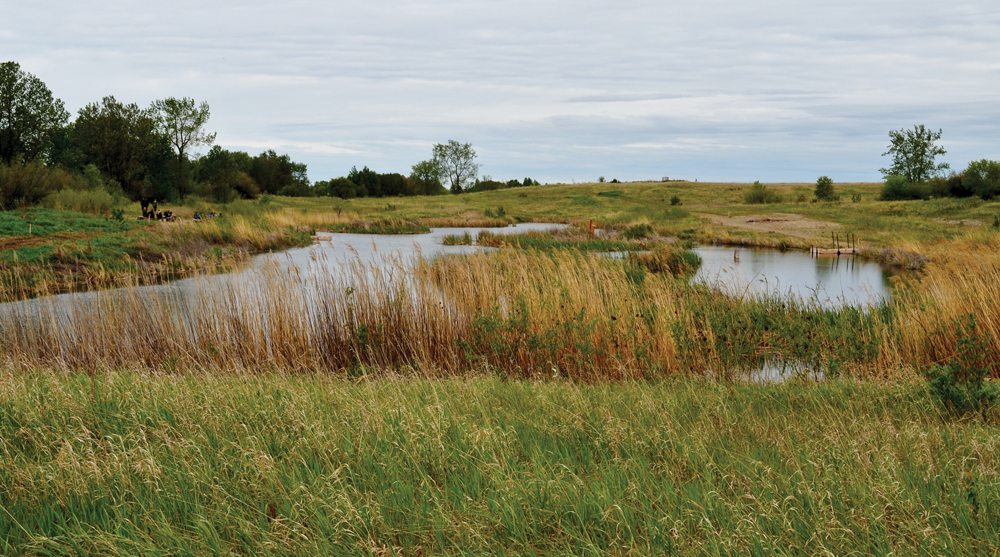A $102-million conservation trust fund announced in the Manitoba government’s March 12 budget could help compensate farmers for protecting the environment, says Keystone Agricultural Producers president Dan Mazier.
“That’s how I see the fund being used, but I’m not certain if all of it will be,” Mazier said from his farm near Justice, Man., in an interview March 16.
KAP lobbied for years for an Ecological Goods and Services program to pay farmers to take less productive, at-risk land out of production and protect it by sowing perennial crops or restoring wetlands. It didn’t happen because of a lack of funds, Mazier said.

“People shouldn’t assume the conservation trust will just be delivered on ag lands, but I’d be amazed if ag lands don’t warrant a high priority,” Tim Sopuck, chief executive officer of the Manitoba Heritage Habitat Corporation (MHHC), which will administer fund spending, said in an interview March 16.
That’s because agriculture occupies so much of the province’s land, at least in the south.
“With something this big and new we want to make sure we get it right so we do need to take some time to make sure the details work,” Sopuck said.
Creation of the conservation trust is one of the budget’s highlights, Mazier said, adding it meshes with the provincial government’s Made-in-Manitoba Climate and Green Plan and a $25-a-tonne carbon tax.
Read Also

Friends of the Bluebirds to mark 50 years
Conservation group Friends of the Bluebirds has been putting out nesting boxes and performing bird counts for the last half-century in western Manitoba.
The conservation trust money will be turned over to the Winnipeg Foundation resulting in funding “in perpetuity” Sustainable Development Minister Rochelle Squires told reporters during a news conference March 15.
It’s estimated the trust will generate around $5 million a year, but organizations will have to match grants from the trust and that could triple the money going to conservation work, Sopuck said.
“This is an amazing opportunity,” he added. “I don’t know what else to say. For me personally, it’s just the biggest thing that’s ever happened in my career. I would never have imagined something this big happening (a) in the conservation world in Manitoba and (b) that I might have a chance to influence it a bit.”
The MHHC, which was created by provincial legislation in 1986, works to conserve fish and wildlife habitat in Manitoba through voluntary agreements with landowners to conserve, restore and enhance habitat on their property.
It also receives donations to assist in its work.
The MHHC reports to the Minister of Sustainable Development and is governed by a board of directors appointed by the Province of Manitoba.
It’s unclear when money from the trust will flow, but Sopuck said first it must be deposited with the Winnipeg Foundation and then allowed to build some earnings.
Squires told reporters water management will be a high priority for the trust.
“We are certainly moving forward on initiatives that will ensure our wetlands are there for future generations,” she said. “We are going to restore a lot of wetlands. Seventy per cent of our wetlands have been lost over the last century. I don’t anticipate that we will be able to restore all of those wetlands… but I certainly do think we can do a better job at enhancing (and) protecting our wetlands.”
It makes sense for improving water quality and supplies, especially as the province tries to mitigate and adapt to climate change, Sopuck said.
“When we have more wetlands, woodlands, grasslands, riparian areas, the landscape can deal with those extremes a little bit better,” he said.
On March 15 the Manitoba government also unveiled Bill 16, the Climate and Green Plan Implementation Act, which incorporates five separate acts connected to the environment and economics, including:
- A new climate and green plan act that would replace The Climate Change and Emissions Reduction Act and The Sustainable Development Act.
- A new industrial greenhouse gas emissions control and reporting act.
- Amendments to The Water Protection Act, The Income Tax Act and The Fuel Tax Act.
“We recognize that climate change is a reality,” Squires said. “The time to act is now…
“The environment is our most precious asset. Without fresh air to breathe, without clean drinking water and without the great outdoors, we don’t have much.”
Squires said an expert advisory council to provide advice and guidance to reduce emissions and help the province adapt to climate change will soon be named.
Mazier said he hopes a KAP member is appointed.
The new legislation includes the carbon tax, which will raise the price of various fuels. Gas will rise by 5.32 cents a litre; diesel, 6.71 cents per litre; natural gas, 4.74 cents per cubic metre and propane, 3.87 cents per litre.
The government estimates the carbon tax on gasoline will cost the average household $125 extra a year.
All marked fuels used in agriculture, fishing, forestry, mining and other sectors, will be exempt — a move welcomed by KAP. However, the carbon taxes paid by companies that supply goods and services to farmers will be passed on to farmers, Mazier added.
There’s some help for big emitters though, including the Koch nitrogen plant in Brandon, to keep such operations competitive.
Until 2019, all entities that are to be included by the government in the Output-Based Pricing System (OBPS) will receive an exemption or a refund from the carbon tax on their emissions from fuels consumed on site and process emissions.
The OBPS will apply to those emitting at least 50,000 tonnes of carbon dioxide equivalent per year with smaller emitters able to opt in upon review and approval by the government.
Mazier expects this will give Manitoba’s canola-crushing plants a break.
The government says the carbon should encourage citizens to emit less carbon, but some observers don’t think it’s high enough to do that.
The Manitoba government says if it didn’t introduce a carbon tax, the federal government would enforce its own starting at $10 a tonne this year and rising to $50 — twice as much as Manitoba’s — by 2022.
Manitoba’s plan is better because it will cost less, cut emissions by an extra 80,000 tonnes and let Manitobans decide how to spend the estimated $248 million in annual revenue the tax will raise, Premier Brian Pallister said in October.
“All the revenue generated from the carbon price will be given back to Manitobans (over the next four years through lower personal income taxes, small-business tax reductions and rolling back the retail sales tax to seven per cent by 2020),” Squires said.
The budget puts 2018-19 estimated government spending on agriculture at $187 million. That’s similar to what the government expects it will spend by the end of the current fiscal year March 31. However, it’s 2.3 per cent lower than the $191.5 million budgeted for in 2017-18.
The government has also slightly increased funding for the Farmland School Tax Rebate to $44.5 million from $41 million.
KAP is disappointed the budget offered no relief on education tax on farmland, Mazier said.
“Our work is already showing that assessment rates (on farmland values) are probably going to go up by about 20 per cent,” he said. “Again we are going to see some unimaginable tax increases for individual producers depending on where they are. I don’t know any other business in Manitoba, or all of Canada, that would put up with 20 or 50 per cent tax increases.”
Because the government didn’t address education taxes Mazier gave the budget a C+ or B- grade.
The Western Canadian Wheat Growers Association welcomed the increase in the small-business tax deduction to $500,000 from $450,000 announced in the budget.
“This will put Manitoba in line with the other Prairie provinces,” association director William Pallister said in a news release, but the association worries about the “devastating” carbon tax.




















